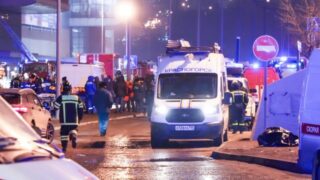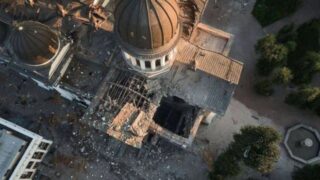An interview with Architect Volodymyr Meshcheriakov, who led the rebuilding of the historical church in 2000–2010.
by Ievgeniia Gidulianova


In August 2023, less than a month after Russia’s missiles heavily damaged the Transfiguration Cathedral of Odesa, Architect Volodymyr Meshcheriakov was in the Ukrainian seaport to assess the damage of the Russian strike.
Ph.D. Arch., Associate Professor, Meshcheriakov is a member of the Ukrainian Committee of ICOMOS (International Council on Monuments and Sites), Chairman of the Odesa regional branch of the Architectural Chamber of the National Union of Architects of Ukraine, forensic expert of the Ministry of Justice of Ukraine, Research Fellow on the British Academy’s Researchers at Risk Programme, and Visiting Scholar at Trinity College, University of Cambridge. He is the author of two monographs and more than seventy scientific publications, articles, theses in the field of architecture and protection of cultural heritage.
Meshcheriakov is a personality whose name is directly connected with the history of the reconstruction of the Odesa Cathedral of the Transfiguration of the Savior, which was completely destroyed during the time of Stalin.
In 1999, a group of architects under his leadership was the laureate of the national call for projects for the reconstruction of the Odesa Cathedral of the Transfiguration of the Savior. The cathedral was rebuilt in 2000–2010 on the basis of his project and he was then awarded the State Prize of Ukraine in the field of architecture for the reconstruction of the Odesa Cathedral. He is also the author of a monograph on this topic.
From your professional point of view, how do you assess the extent of the destruction caused to the Transfiguration Cathedral as a result of the Russian missile shelling on Odesa on the night of 23 July 2023?
Volodymyr Meshcheriakov: The rocket passed vertically through the roof above the right altar, destroying the floor of the cathedral and two underground reinforced concrete floors of the lower part of the church. The walls of this part of the building were significantly damaged. More than 70% of the roof structures and copper covering of the cathedral were completely destroyed or damaged by shrapnel and the blast wave. Almost all the copper coating of the roof of the cathedral is subject to dismantling and restoration. The artistic decoration of the premises of the upper part of the building was almost completely destroyed. All iconostases were also thoroughly destroyed—the marble one and the two side ones. The marble flooring was significantly damaged by rocket fragments.


How much do you think it will cost to completely restore the Odesa Cathedral of the Transfiguration of the Savior?
Volodymyr Meshcheriakov: The exact amount required for the complete restoration of the cathedral can only be determined on the basis of the development of a scientific study, design, and estimate documentation for the needed work. The preparation of documentation for a detailed survey, dismantling and restoring the damaged structures, architectural and artistic decoration inside and outside of the cathedral is a big job that can take several years. So far, the development of such documentation according to my information is not underway, and the proposals for such work and sources of funding have not been identified.
I am a forensic expert at the Ministry of Justice of Ukraine, and I believe that one of the elements of documentation for the restoration of the cathedral and other destroyed objects should be a forensic report with conclusions and the amount of damage. In my opinion, this amount may be equivalent to five million dollars. The amount needed for the restoration of the cathedral in its original form can be brought in court for compensation to the aggressor country.
How long can it take to achieve the restoration?
Volodymyr Meshcheriakov: I think that after identifying the sources of financing, the donors, and the rebuilding companies, it will take five to ten years of intensive and qualified work to completely restore the cathedral. Now, first of all, it is necessary to inspect the cathedral and prepare design estimates for restoration.
The cathedral was built and reconstructed in stages over more than a hundred years. The Cathedral Square was designated in 1794 on the first plan of Odesa drawn up by the Dutch military engineer Franz De Volan. After the last reconstruction in 1900–1903, it accommodated up to 12,000 people and was the largest church building in the south of Ukraine, the center of spiritual life for Odesa residents.
In 1936, the Odesa Cathedral of the Transfiguration of the Savior was robbed and destroyed by the Soviet authorities, like many other churches in the USSR.
In 1991, I began collecting original data and other information about the cathedral, and in 1993, under my leadership, the first project to reconstruct this outstanding lost cultural heritage site of Ukraine was completed.
In 1999 our project to rebuild the cathedral won a national competition and we continued to further develop the project. The cathedral was built in three stages, starting in 2000. In 2007, it was put into operation, received the status of a historical monument of local significance in Ukraine, and was solemnly consecrated in 2010. Construction, decorative and artistic work continued for more than ten years without the use of public funds, based exclusively on donations from citizens, enterprises, and various other organizations. The Black Sea Orthodox Fund was created in Odesa to collect funds and donations for the design, construction, and artistic decoration of the cathedral.
Are any works already underway related to urgent measures aimed at preserving and protecting the cathedral as an object of cultural heritage of Ukraine from further destruction?
Volodymyr Meshcheriakov: At the moment, thanks to the efforts of citizens, the rubble of fragments of destroyed structures and the interior of the cathedral has been cleared. The main thing now is the installation of temporary covering before the autumn-winter period, protecting the interiors from rain and snow. Work in this direction is proactively underway, but they are insufficient in my opinion.
All forces and means of Ukraine are now aimed at ensuring the Ukrainian army for victory over the terrible aggressor—Putin’s Russia. Also, first of all, Ukrainian citizens whose homes have been destroyed need financial support. The cathedral building is owned by the Odesa Diocese of the Ukrainian Orthodox Church (UOC), which also helps refugees and does not have such significant funds for the restoration of the Transfiguration Cathedral.


Who in Ukraine promised to contribute to the reconstruction? What is the amount of their promised contribution?
Volodymyr Meshcheriakov: Odesa Cathedral in 1999 was included in the State Program for the Reconstruction of the Outstanding Lost Cultural Heritage Sites of Ukraine, which provides for the allocation of funding for all work but no funding for this project was ever allocated. The Black Sea Orthodox Fund has been opened to collect funds for the restoration of the cathedral. To date, I have no information about the Ukrainians who volunteered to finance the restoration of the cathedral destroyed by the Russian missile attack.
Have the city authorities of Odesa approached you with an offer to take part in the restoration of the Odesa Transfiguration Cathedral?
Volodymyr Meshcheriakov: No, they did not contact me. As the head of the team of designers of the rebuilt cathedral, I consider it necessary to make visible for present and future generations the fact that the Odesa shrine was destroyed by a Russian missile. To this end, the restoration project should include a provision mentioning the origin of the destruction on the main damaged walls outside the cathedral and inside. To do this, in a future restoration project, cracks in the damaged walls outside and inside the cathedral should be recorded and revealed in red. Such a decision will visually immortalize the strike of a Russian missile on the Odesa Cathedral. The recorded and highlighted destruction of this part of the cathedral can become one of the memorial sites of Ukraine in memory of the military aggression of Putin’s Russia.








